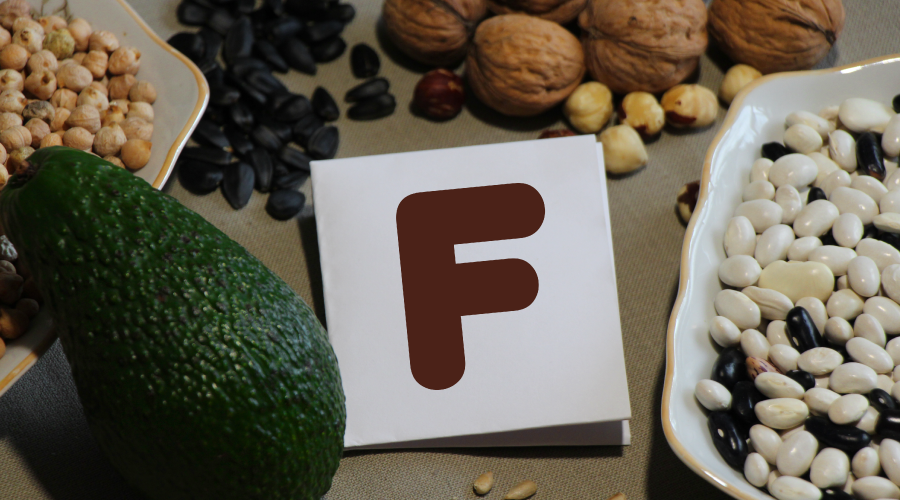

Vitamin F is not a vitamin in its true sense. It is a combination of two essential fatty acids. But like vitamins, the two fats are essential for regular body functions, especially for heart and brain health. The two essential fatty acids that makeup Vitamin F are – alpha-linolenic acid and linoleic acid. While alpha-linolenic acid belongs to the Omega-3 family, linoleic acid is a member of the Omega-6 fatty acid family. The two are widely present in foods like fish and plant-based food sources like oils, nuts, and seeds.
Role of Vitamin F in the Body
Alpha-linolenic acid and linoleic acid are fats. As the body cannot produce them, they are termed as essential; hence they are called essential fatty acids and must be sourced through diet. They are important for the following functions:

- Source of Calories – As fats, alpha-linolenic acid and linoleic acid provide calories to the body. During digestion, they are converted into energy. Every 1 gram of Vitamin F contains nine calories.
- Forms Cell Structure – The fats are important for providing cell structure. They promote flexibility in the outer layer of the cells.
- Promotes Growth and Development – The two essential fatty acids are important for the growth and development of the body.
- Improves Health – Vitamin F helps the body make signalling compounds. These are important for the regulation of blood pressure, blood clotting, immune health responses and other body functions.
- Converted to other fats – The body converts alpha-linolenic acid and linoleic acid into other fats which are required by the body for overall health.
Vitamin F Benefits
As mentioned above, Vitamin F has an important role to play in the body. The two essential fatty acids are responsible for controlling various body processes. Adequate intake of Vitamin F benefits the body in the following ways:
1. Promotes Brain Health and Improves Cognitive Ability
The brain cells are made up of polyunsaturated fatty acids. The fats in the brain cells ensure that the neurons and synapses of the brain develop properly. These are important for the brain and body to function properly. Studies show that Vitamin F helps lower the risk of Alzheimer’s disease, dementia and other cognitive diseases. The essential fatty acids also reduce symptoms of depression and anxiety.
2. Improves Heart Health
Both alpha-linolenic acid and linoleic acid are polyunsaturated fatty acids. Unlike saturated fatty acids that increase cholesterol and damage heart health, fats in Vitamin F are heart-healthy. Adequate intake of Vitamin F helps reduce the risk of coronary heart disease and cardiovascular mortality.
3. Promotes Skin Quality
The linoleic acid of Vitamin F forms the outermost layer of the skin. The layer acts as a barrier for the skin and protects it from external factors like pathogens, bacteria, germs, and harmful UV radiation. The topical application of Vitamin F in the form of oils and skin creams further improves skin quality and health. Vitamin F also has anti-inflammatory properties that protect the skin from several skin diseases.
4. Provides Relief from Rheumatoid Arthritis
Rheumatoid arthritis is an autoimmune disease marked by chronic inflammation in the joints of the hands and feet. Vitamin F possesses great anti-inflammatory properties which cut down on inflammation, providing relief from painful swelling.
5. Helps Improve Diabetes
Consisting of polyunsaturated fats, Vitamin F helps in better blood sugar control and management. Research shows that a high intake of polyunsaturated fats helps reduce the risk of diabetes as compared to consuming saturated fats.
6. Promotes Hydration
The omega-6 fatty acids in Vitamin F have great hydrating properties. They help maintain healthy moisture levels in the body, reducing the risk of dehydration. Optimum hydration levels keep the body organs healthy and lend a healthy glow to the skin. It also protects the skin from premature ageing.
7. Promotes Eye Health
The polyunsaturated fats in Vitamin F are crucial for the development of the retina and its proper functioning. The hydrating property of Vitamin F provides relief from symptoms of dry eye. Good health of the retina improves vision and lowers the risk of age-related macular degeneration.
8. Aids in Foetal Development
The compound in Vitamin F benefits the growth of the developing foetus. Pregnant women are therefore advised adequate amounts of Omega-3 and Omega-6 fatty acids.
Recommended Dose of Vitamin F
To ensure good and healthy functioning of the brain and mind, a healthy intake of Vitamin F is recommended.
Researchers feel an ideal ratio of Omega-6: Omega-3 fatty acids must be 4:1 or lower. Therefore, adults must consume 1.1–1.6 gm of alpha-linolenic acid or Omega-3 fatty acids and 11–16 gm of linoleic acid or Omega-6 fatty acids per day to reap the maximum Vitamin F benefits.
Vitamin F in Diet
Vitamin F cannot be produced in the body. It must therefore be sourced through a diet rich in vitamin F. The main Vitamin F foods are:
Foods Rich in Alpha-Linolenic Acid (ALA)
The plant-based alpha-linolenic acid sources are:
- Every 15 ml of flaxseed oil contains 7 gm of ALA
- Every 28 gm serving of flax seeds confers 6.5 gm of ALA
- Every 28 gm of chia seeds contains 5 gm of ALA
- Every 28 gm serving of hemp seeds contains 3 gm of ALA
- Every 28 gm of walnuts contains 2.5 gm of ALA
- Every 44 gm of brussels sprouts contains 44 gm of ALA
- Every 15 ml serving of perilla oil contains 9 gm of ALA
Foods Rich in Linolenic Acid (LA)
The common sources of Linolenic Acid are:
- Every 15 ml serving of soybean oil contains 7 gm of LA
- Every 15 ml serving of olive oil contains 10 gm of LA
- Every 15 ml serving of corn oil contains 7 gm of LA
- Every 15 ml serving of avocado oil contains 1.7 gm of LA
- Every 28 gm serving of sunflower seeds contains 11 gm of LA
- Every 28 gm serving of pecans contains 6 gm of LA
- Every 28 gm serving of almonds contains 3.5 gm of LA
- Every 15 ml serving of safflower oil contains 1.7 gm of LA
- Every 100 gm serving of Tofu contains 5 gm of LA
- Every 100 gm serving of peanut butter contains 12 gm of LA
Fish like salmon, tuna and sardines are a rich source of both ALA and LA. Green leafy vegetables like spinach, and broccoli are also healthy sources of vitamin F.
Vitamin F Supplements
In addition to the naturally available foods, some foods like infant formula, juices and dairy products are also fortified with Vitamin F. Furthermore, there are over-the-counter available Vitamin F supplements that can be added to a daily diet. However, Vitamin F supplements can cause unwanted interaction with ongoing medication.
The possible side-effects of Vitamin F supplements include:
- Unpleasant taste in the mouth
- Bad breath
- Foul smelling sweat
- Persistent nausea and headache
- Heartburning
- Pain in the stomach
- Diarrhoea
Conclusion
Despite its name, Vitamin F is not a vitamin. Vitamin F is a combination of two essential fatty acids – alpha-linolenic acid and linoleic acid from the family of Omega-3 and Omega-6 fats, respectively. Both alpha-linolenic acid and linoleic acid are polyunsaturated fatty acids that make up the brain cells. Vitamin F also plays a crucial role in regulating body processes like controlling immune system response, blood pressure and blood sugar management, blood clotting, and growth and development of the body.
As the body cannot produce Vitamin F, it is to be sourced through Vitamin Ffoods. Oils, nuts and seeds are the best sources of Vitamin F in food. One can also take Vitamin F supplements but should be wary of the side effects. Furthermore, as Vitamin F constitutes fats, excessive intake of Vitamin F can have negative effects on health. Also, every 1 gram of Vitamin F in food confers nine calories which can interfere with the weight loss diet. Therefore, maintaining an ideal ratio of 4:1 of linoleic acid: alpha-linolenic acid can help reap maximum Vitamin F benefits.




